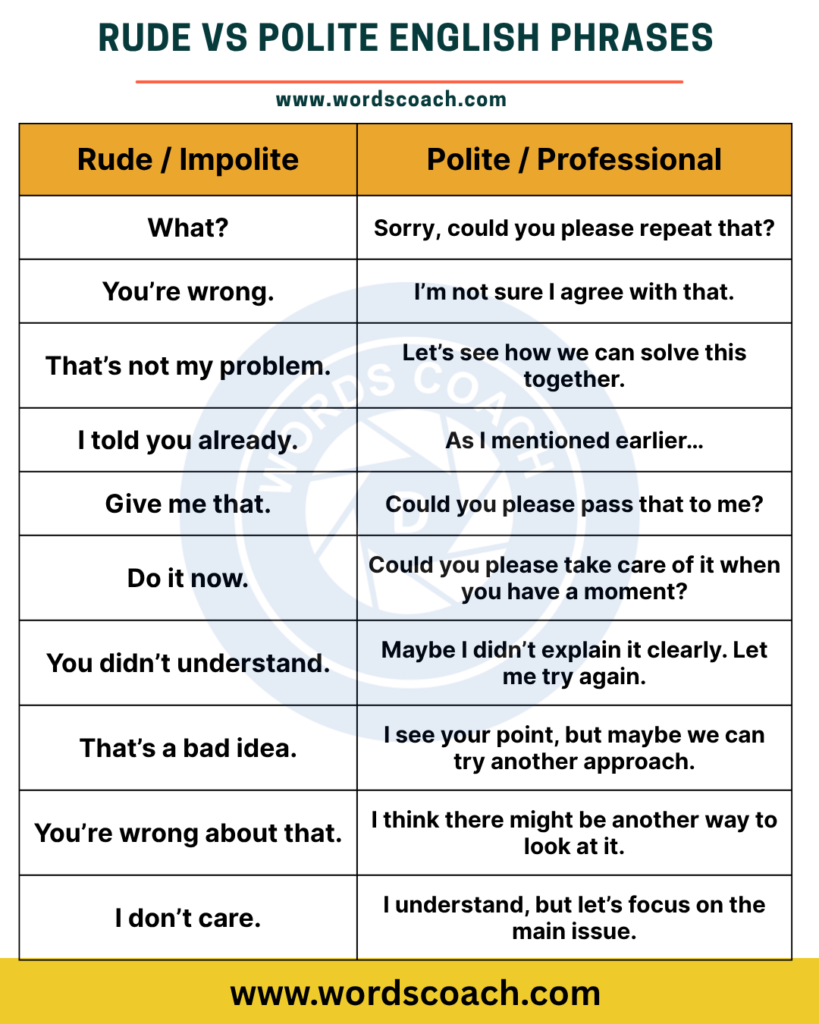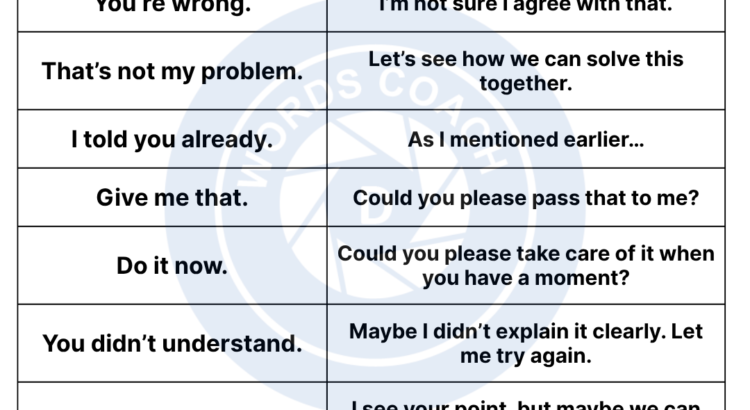Rude Vs Polite English Phrases
Language is powerful it can build relationships or break them. The way we express ourselves often matters more than what we actually say. Sometimes, English learners unintentionally sound rude because of direct word choices or tone.
Why Politeness Matters in English
English, especially in formal or international settings, values courtesy and soft communication. Native speakers often avoid being too direct because it can sound impolite, even if it’s grammatically correct.
Example:
- ❌ “Give me the pen.” (Sounds rude)
- ✅ “Could you please pass me the pen?” (Sounds polite and kind)
List of Rude Vs Polite English Phrases
| Rude / Impolite | Polite / Professional |
|---|---|
| What? | Sorry, could you please repeat that? |
| You’re wrong. | I’m not sure I agree with that. |
| That’s not my problem. | Let’s see how we can solve this together. |
| I told you already. | As I mentioned earlier… |
| You’re late again! | I noticed you arrived a bit late. Is everything okay? |
| Give me that. | Could you please pass that to me? |
| Do it now. | Could you please take care of it when you have a moment? |
| You didn’t understand. | Maybe I didn’t explain it clearly. Let me try again. |
| That’s a bad idea. | I see your point, but maybe we can try another approach. |
| You’re wrong about that. | I think there might be another way to look at it. |
| Calm down! | Please take a moment — let’s talk about this calmly. |
| You should have done this. | It would’ve been better if we had done this earlier. |
| I don’t care. | I understand, but let’s focus on the main issue. |
| You’re making no sense. | Could you clarify what you mean? |
| Be quiet! | Could we lower our voices a bit, please? |
| Move! | Excuse me, could I get through, please? |
| That’s stupid. | I’m not sure that will work as intended. |
| You didn’t listen. | Maybe there was a misunderstanding. Let’s go over it again. |
| I’m busy. | I’m a bit tied up right now, can we talk later? |
| You’re annoying. | I need a little space right now, if you don’t mind. |
| That’s your fault. | I think we both could have handled that better. |
| Stop talking. | Let’s come back to this in a moment. |
| You have to do this. | I’d really appreciate it if you could handle this. |
| You’re lying. | I think there’s been a misunderstanding. |
| Hurry up! | Could we try to finish a bit faster, please? |
| You don’t know anything. | Maybe we can go over this together. |
| It’s none of your business. | I’d rather not talk about that right now, if that’s okay. |
| You look terrible today. | You seem tired today — are you feeling alright? |
| Shut up! | Could we have a bit of quiet, please? |
| That’s not my job. | I’m not responsible for that, but I can point you to the right person. |
Learning how to be polite in English isn’t just about using “please” or “thank you.” It’s about tone, respect, and empathy in communication. By replacing direct or harsh words with gentle ones, you show emotional intelligence and confidence qualities that always leave a great impression.
Download Word Coach Application


